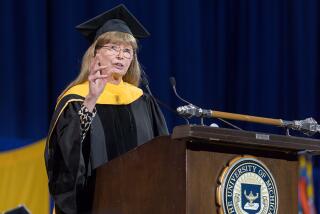Millard Found Key to Success but Some Resent His Lock on Profits
- Share via
OAKLAND — ComputerLand Corp. founder William Millard might not have been far off the mark when he described himself as “the biggest winner of all in the microcomputer industry.”
Consider the numbers. The company, which had 24 franchised stores at the end of 1977, now boasts 792 stores in two dozen countries and expects to add 250 more outlets by year-end. Sales hit $1.4 billion in 1984 and are expected to top $1.8 billion in 1985.
Of that, ComputerLand takes a flat 8% royalty off the top plus an additional 1% to defray advertising expenses. The royalty arrangement, plus the sale of new franchises, has helped to insulate ComputerLand from the current shakeout in the computer-retailing business; while its franchisees’ profit margins are being squeezed by intense price competition, ComputerLand serenely continues to collect 8 cents on every sales dollar.
The company’s growth has allowed Millard to amass all the accompaniments of great wealth: a spectacular home in the Piedmont hills, two corporate jets, a Mercedes 450 SEL, around-the-clock bodyguards, a 300-acre vineyard and a fish farm.
Earlier Ventures Failed
Millard hasn’t always been so successful. His first two computer-related business ventures--a programming company and an early maker of microcomputers--went under. Creditors of the microcomputer company, which failed just as ComputerLand was beginning to thrive, are still upset that they weren’t able to transfer their claims to ComputerLand.
Despite his early reverses, Millard has never been one to accept failure, a trait that was accentuated when he joined the self-help movement known as est and became a friend and disciple of est founder Werner Erhard.
ComputerLand President Barbara Millard, who introduced her father to est, says that outsiders have exaggerated the movement’s influence on ComputerLand. “People have portrayed it as the blinding light that leads me,” she says. What est has done for her, she says, is to allow her to “know myself better, express myself better and be more effective.”
And while most of ComputerLand’s top officials in the early years were est-trained, she says the company’s rapid growth has “diluted” the movement’s influence. Still, the est vocabulary remains a fixture at ComputerLand’s headquarters; such phrases as “Where are you coming from?” and “I need space” are standard corporate lingo.
Classic Example
And Millard himself gave a classic example of est-speak during an interview with the authors of the 1984 book “The Computer Entrepreneurs.”
ComputerLand, he said, “is probably the No. 1 place to work on the planet earth. My purpose is to be viable so that we have the opportunity to have a place where we can live out our lives together. In a way that really and truly is nurturing to myself and to everyone else who is here, and to other people who we interact with and deal with from the outside.”
But Millard’s idea of nurturing his employees doesn’t usually extend to sharing ownership of his company. He once promised employees a stock ownership plan--and then abruptly canceled it.
There are two exceptions: John Martin-Musumeci was given a 1% stake in ComputerLand for his role in developing the franchising system and is now leading Micro/Vest’s effort to get 20% of ComputerLand. Ed Faber, a former ComputerLand president, left with a 3% stake. The rest is held by Millard and his wife, Patricia, through a family holding company.
A former key executive recalls how Millard would deflect requests for stock. “He’d say, ‘Well, gee, this is a privately held company, and there’s no stock available.’ And that was that. It was just his way of saying, ‘I’m not giving you any stock.’ ”
It is no small irony, then, that Millard’s struggle to retain total control, which has climaxed in Micro/Vest winning $125 million in punitive damages, may lead to his losing ComputerLand or a significant chunk of it. Some of ComputerLand’s franchisees would welcome a dose of new management.
Viewpoint Narrow
“Millard’s viewpoint is very narrow,” says Robert McMillan, vice president for finance of ComputerLand of San Francisco, which operates three stores. “Anytime you have an opportunity to expand management’s view and horizon, it’s beneficial.”
As for the charge that greed led to Millard’s problems in the current lawsuit, well, Barbara Millard, who has worked in her father’s enterprises since she was 12, just doesn’t see it that way. Never mind that computer entrepreneurs such as the founders of Apple Computer Inc. or Hewlett-Packard Co. have avoided such problems by spreading the wealth around.
“If you succeed, you’re the target of people’s resentment even if you’re the nicest guy in the world,” she says.
Barbara Millard, who has been president of ComputerLand since last November, says it “took a lot of courage” to sit in court and hear her father portrayed in such negative terms. “It’s just so hard,” she says. “Sometimes you just want to jump up and say, ‘That’s not so.’ ”
COMPUTERLAND’S DRAMATIC GROWTH
Stores Year Sales (at year-end) 1977 $1.5 million 24 ’78 13 million 62 ’79 35.5 million 103 ’80 74.8 million 147 ’81 151.2 million 232 ’82 451 million 390 ’83 963.4 million 614 ’84 1.4 billion 781 ’85 1.8 billion 1,050 (forecast)






